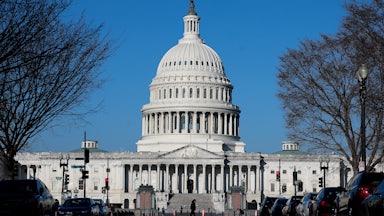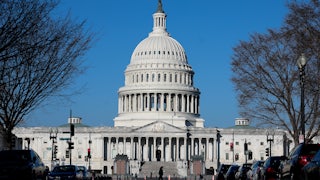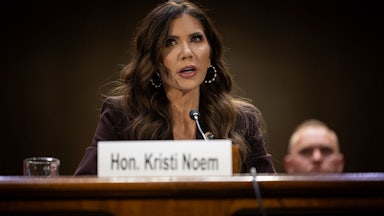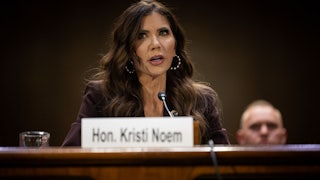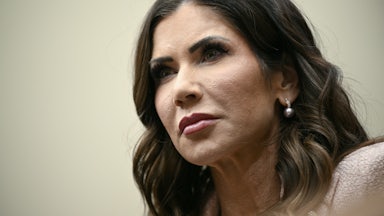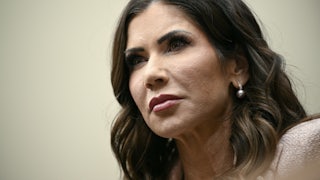The mainstream press has been criticized for normalizing, or “sanewashing,” Donald Trump and his political allies. Having spent my career migrating back and forth between “straight news” and opinion journalism, I take a more sympathetic view. Reporting the news without expressing your personal opinion imposes valuable discipline. Among other benefits, it minimizes facile shortcuts, which are opinion journalism’s principal vice (and the lingua franca of social media).
When I was a straight-news editor, I found that eliminating bias (also pretension, redundancy, and other categories of bad writing) was often a simple matter of deleting adjectives. Adjective-rich copy is self-indulgent, and unless your invective matches the artistry of H.L. Mencken or Hunter S. Thompson—which it doesn’t—you should avoid it.
But there’s nothing simple about covering Trumpworld, with its habitual lying, racism, misogyny, and all-around bad behavior. Here the straight-news community falls back on euphemism. Today, we’ll consider the euphemism fiery.
Euphemism is what straight news resorts to when circumstances require it to describe that which is demonstrably unacceptable. The need didn’t use to come up all that often. If a government official lied, no one expected a straight-news reporter to write, “He lied.” Instead, the reporter would juxtapose what the official said with the evidence that it wasn’t true. Readers understood that meant The New York Times or The Washington Post was calling that official a liar, by demonstrating it.
Thus when the Post’s own publisher, William Lewis, denied last June that he’d told the paper’s departing editor, Sally Buzbee, that her decision to run a piece about a legal proceeding that portrayed Lewis in a bad light represented “a lapse in judgment,” three Post reporters did not write, “Our publisher is a liar.” Instead, they reported that “two people familiar with the meeting” confirmed that Lewis dressed Buzbee down in the manner described and that a third person said it wasn’t the first time Lewis expressed unprofessional anger at Buzbee for running a story that made him look bad. In journalism as in art, showing is better than telling.
But when the lies and other bad behavior are coming so fast that generalization is unavoidable, straight-newsers reach for euphemism. Critics of the mainstream media call this cowardly and despicable. I call it practical. Euphemism helps avert libel suits and those awful screaming tantrums from sources or from readers to which a reporter invariably replies, noncommittally, “I’m sorry you feel that way,” which only makes the complainant scream louder. Euphemism doesn’t eliminate these perils, but it reduces them, and at a pretty small price. You just have to know the dialect.
The meaning of mainstream media euphemisms has always been pretty plain to me, even before I entered the business. But just as I need my daughter, Alice, to translate when she says, “John is rizzing up trade”—it means “John is flirting with someone attractive”—it stands to reason that a new generation might need help with the word fiery. It means “sociopathic or clinically insane.”
Suddenly the news is full of fiery people. Stephen Miller is “fiery” (Associated Press, CNN). Elise Stefanik is “fiery” (Politico, Albany Times Union). Matt Gaetz is “fiery” (New York Times, Sky News) and also a “firebrand” (Financial Times, Reuters). Gaetz is so proud of the latter that in 2020 he published a book titled Firebrand. The puppy-killing South Dakota Governor Kristi Noem, whom Trump nominated for secretary of homeland security, is another “firebrand” (Fox News). So is Pete Hegseth (Financial Times, Daily Mail), the ax-throwing Fox News personality Trump nominated for secretary of defense. So is the Trump superloyalist Kash Patel (Daily Mail), rumored to be Trump’s pick for FBI director. This is all just in the past week. Little fires everywhere.
The one person who hasn’t been called “fiery” or “firebrand” lately is Robert Kennedy Jr. I find this omission puzzling, given that Trump’s nominee for health and human services secretary practically stepped out of a textbook on abnormal psychology: whale-beheader, dead-bear fancier, sex diarist, etc. And that’s before we plumb RFK Jr.’s novel opinions against vaccines and fluoridation. Maybe the press feels squeamish about the worm that ate part of Kennedy’s brain. But they don’t come much fierier.
Some might object that fiery and firebrand sound like compliments (as euphemisms often do). Who wouldn’t like to be fiery? The term summons mental images of charismatic preachers and warriors for social justice, like John L. Lewis or Martin Luther King Jr. Once in a while the mainstream media will use “fiery” to describe some genuinely righteous soul or other. In 2003, for instance, CBS News reported that the former South African President Nelson Mandela delivered a “fiery speech” denouncing President George W. Bush’s preparations for war in Iraq. Two decades later, most agree Mandela was the intelligent and sane one in that disagreement and that Bush, under the spell of Vice President Dick Cheney and his own childish urge to best his father, was a few fries short of a Happy Meal.
Usually, though, when a mainstream outlet calls somebody “fiery,” the reporter is sending a coded message. “This person is dangerous,” the reporter is saying, “unable to govern himself, much less the country.” If the fiery person in question is a Cabinet nominee, fiery may also convey that this person is very likely un-confirmable, even in a Republican-controlled Senate (though Stefanik and Noem probably won’t have that problem). Fiery politicians know that fiery is code for nutter, but they don’t usually complain. I guess they figure the word will sound like praise to the great mass of voters, who anyway don’t follow the news. (Demagogue or monster might filter down.)
America’s firebrand in chief is Donald Trump. We’ve all been witnessing Trump’s mental derangement for so long that when the press describes Trump as “fiery” it has come to mean more than just “toxic and unhinged.” It means “more toxic and unhinged than usual.” Trump’s “tell” in such circumstances is that he starts calling everyone else crazy. In a “fiery speech” last year after he was indicted in the classified-documents case (NBC News), Trump called special counsel Jack Smith “deranged.” In his first rally after the assassination attempt, Trump delivered a “fiery, two-hour speech” (Al Jazeera), in which he called Nancy Pelosi “crazy as a bed bug.”
We’ll have plenty of time over the next four years to grow heartily sick of all this fire. Does calling these people fascist or demented or fucking awful really help? It didn’t when the Democrats tried during the campaign. To paraphrase William Shakespeare, a turd by any other name would smell as foul. A better way to nail this unsavory crowd is to assemble damning fact after damning fact demonstrating their corruption and incompetence. That’s almost as true for commentary as it is for straight news. Just follow the trail of smoke. God knows it’s everywhere.





